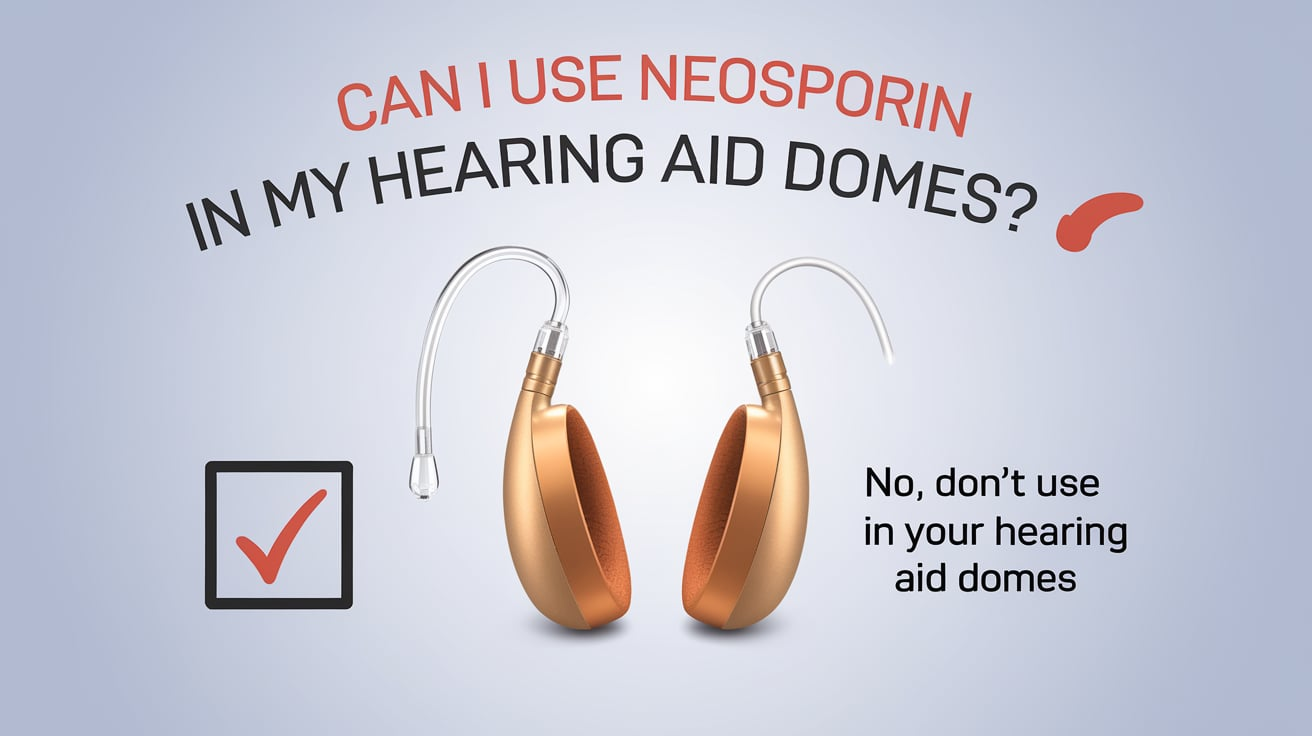
If you wear hearing aids, you could have once had an infection or ear discomfort. Of course, Naturally, you might wonder, Can I use Neosporin in my hearing aid domes? It seems like a quick fix, but knowing whether this is a safe and effective option is essential. This article will explore why using Neosporin in your hearing aid domes may not be a good idea and what other options are available.
What Are Hearing Aid Domes?
Little silicone components called “hearing aid domes” are attached to the end of your devices. They sit inside your ear canal and help amplify sounds. Given their placement, you might think that using Neosporin could help with discomfort, but the question remains: Can I use Neosporin in my hearing aid domes?
What Is Neosporin Used For?
Neosporin is a widely used over-the-counter antibiotic ointment for treating minor cuts, scrapes, and burns. It prevents infections by stopping bacterial growth. While it works wonders for external wounds, you may still be left asking, Can I Use Neosporin in My Hearing Aid Domes The answer is more complicated than it seems at first.
Read more: Hammond Model 8014M Finish Wood Categories Organs Year 70’s
Is It Safe to Use Neosporin in My Hearing Aid Domes?
When asking yourself, Can I use Neosporin in my hearing aid domes? it’s essential to consider the potential risks. Here’s why it’s not recommended:
- Sound Blockage: Neosporin is an ointment that could block the sound pathways in your hearing aid domes. Its thick consistency may clog the small openings, reducing sound quality and impairing the device’s effectiveness.
- Damage to Your Hearing Aids: The oils and ingredients in Neosporin could potentially damage the sensitive electronic components of your hearing aids. When you apply ointments to hearing aid domes, the substance may seep into the device, leading to malfunctions or even permanent damage.
- Increased Risk of Infection: Rather than healing, using Neosporin in your ear may trap moisture, creating an ideal environment for bacteria to thrive. This could increase the risk of infections, worsening the situation.
- Difficult to Clean: Neosporin is sticky, and cleaning it from your hearing aid domes can be a hassle. Its residue can build up, requiring you to clean your hearing aids more frequently, which can be time-consuming and possibly damaging to the device.
Can I Use Neosporin in My Hearing Aid Domes? No, it’s not a safe or practical solution.
What Should You Do If Your Ears Are Irritated?
If you’re dealing with ear irritation, here are some better alternatives than using Neosporin in your hearing aid domes:
- Consult a Doctor: The best action is to consult your doctor or audiologist. They can diagnose the issue and prescribe appropriate treatment, such as ear drops specifically made for ear infections or irritation.
- Remove Your Hearing Aids Temporarily: Giving your ears a break from the hearing aids can reduce irritation. Letting your ears rest for a few hours could alleviate the discomfort.
- Use Ear-Specific Products: Instead of wondering if can I use Neosporin in my hearing aid domes, ask about products designed for ear use. Ear drops or ointments a healthcare professional prescribes are much safer and more effective.
- Keep Your Hearing Aids Clean: Regular cleaning of your hearing aids can prevent irritation caused by earwax or debris buildup. Cleaning tools explicitly made for hearing aids can help maintain their performance and keep your ears healthy.
Why You Shouldn’t Use Neosporin in Hearing Aids
Many people ask, Can I Use Neosporin in My Hearing Aid Domes” because they believe it will function similarly to how it acts on wounds on the skin. However, hearing aids are electronic devices, and Neosporin is not designed for use inside the ear or with such devices. Even though Neosporin is a common household item, its ingredients are unsafe for internal use or delicate devices like hearing aids.
In addition to potentially damaging your hearing aids, using Neosporin could irritate your ear canal further. Trapping moisture inside the ear is the last thing you want to do when dealing with ear discomfort.
What Are Some Safe Alternatives?
As opposed to enquiring, Can I use Neosporin in my hearing aid domes? consider using these safer alternatives:
- Ear Drops: Ear drops formulated explicitly for infections or irritation are far more suitable for ear canal issues. These are usually available over the counter or by prescription.
- Hydrogen Peroxide: A diluted solution can help clean out excess earwax. However, before attempting this procedure, always get your doctor’s approval
- Ear Lubricants: Some ear lubricants are specially designed for hearing aid users to reduce irritation caused by friction between the domes and the ear canal.
- Warm Compresses: Applying a warm compress to the outer ear can reduce irritation and soothe discomfort without interfering with your hearing aids.
How to Prevent Ear Infections and Irritation
While it’s natural to wonder, Can I use Neosporin in my hearing aid domes? prevention is always better than treatment. Here are some tips to help you avoid ear infections or irritation:
- Clean Your Hearing Aids Regularly: Keeping your hearing aids and domes clean can prevent earwax buildup, a common cause of irritation.
- Keep Your Ears Dry: Moisture can lead to infections, so make sure your ears are dry before inserting your hearing aids, especially after swimming or bathing.
- Replace Domes Frequently: Hearing aid domes should be replaced regularly to maintain comfort and prevent irritation.
- Ensure a Proper Fit: If your hearing aid domes don’t fit well, they could cause discomfort. Ask your audiologist to check the fit if you experience any issues.
Conclusion
Can I Use Neosporin in My Hearing Aid Domes The clear answer is no. While Neosporin is excellent for treating cuts and scrapes, it is not designed for use inside the ear or on hearing aids. Using it could lead to poor sound quality, damage to your hearing aids, and even worse ear infections. Instead, focus on safe and effective alternatives like ear drops, warm compresses, or consulting with a healthcare provider. Doing so will protect your hearing aids and keep your ears healthy in the long term.


